
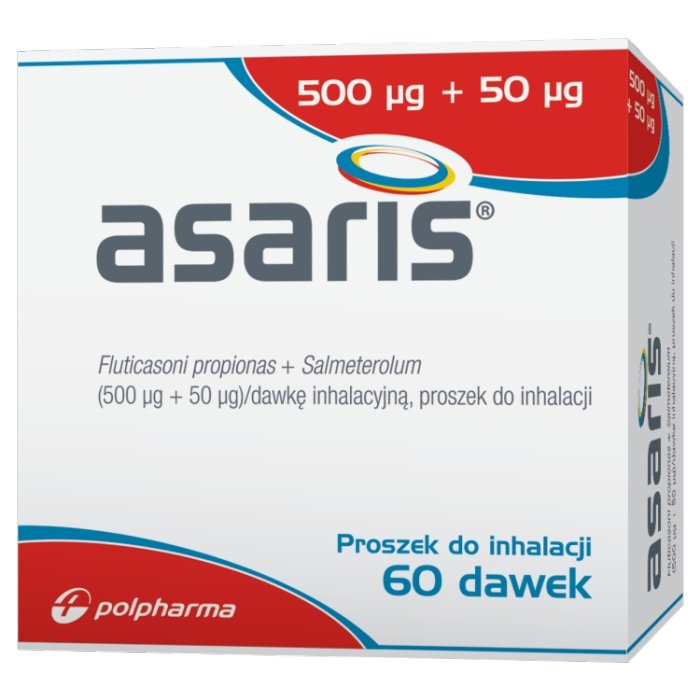
Asaris

Ask a doctor about a prescription for Asaris

How to use Asaris
Leaflet attached to the packaging: patient information
Asaris, (100 μg + 50 μg)/inhalation dose, inhalation powder
Asaris, (250 μg + 50 μg)/inhalation dose, inhalation powder
Asaris, (500 μg + 50 μg)/inhalation dose, inhalation powder
Fluticasone propionate + Salmeterol
You should carefully read the contents of the leaflet before using the medicine, as it contains important information for the patient.
- You should keep this leaflet, so that you can read it again if necessary.
- In case of any doubts, you should consult a doctor or pharmacist.
- This medicine has been prescribed specifically for this person. It should not be passed on to others. The medicine may harm another person, even if the symptoms of their illness are the same.
- If the patient experiences any side effects, including any side effects not listed in this leaflet, they should tell their doctor or pharmacist. See section 4.
Table of contents of the leaflet
- 1. What is Asaris and what is it used for
- 2. Important information before using Asaris
- 3. How to use Asaris
- 4. Possible side effects
- 5. How to store Asaris
- 6. Package contents and other information
1. What is Asaris and what is it used for
Asaris is a combination medicine that contains two active substances: salmeterol and fluticasone propionate.
Salmeterol belongs to a group of medicines called long-acting bronchodilators (the effect lasts for at least 12 hours). It allows for easier airflow in the airways and to and from the lungs.
Fluticasone propionate belongs to a group of medicines called corticosteroids, which reduce swelling and irritation of the lungs.
The doctor has prescribed this medicine to the patient to prevent breathing disorders that occur in:
- asthma,
- chronic obstructive pulmonary disease (COPD). Asaris at a dose of 500 μg + 50 μg reduces the number of exacerbations of COPD symptoms.
In order to ensure proper control of asthma or COPD, Asaris must be used every day as recommended by the doctor.
Asaris does not work to control sudden attacks of shortness of breath or wheezing in the airways, in which case it is necessary to use a fast-acting bronchodilator immediately.
2. Important information before using Asaris
When not to use Asaris
Warnings and precautions
Before starting to use Asaris, you should discuss it with your doctor or pharmacist.
If the patient experiences blurred vision or other vision disturbances, they should contact their doctor.
The medicine should not be started in case of asthma exacerbation or significant worsening of asthma control. If, after starting to use Asaris, the symptoms of asthma worsen or are not properly controlled, the patient should continue the treatment and contact their doctor.
The doctor will closely monitor the treatment in case of conditions such as:
- heart disease, including irregular or rapid heartbeat,
- hyperthyroidism,
- high blood pressure,
- diabetes (the medicine may increase blood glucose levels),
- low potassium levels in the blood,
- tuberculosis currently being treated or having been treated in the past. If the patient has ever had any of these conditions, they should tell their doctor before starting to use Asaris.
Children and adolescents
The medicine is not recommended for use in children under 4 years of age.
During long-term use of high doses of inhaled corticosteroids, such as Asaris, systemic effects may occur. Children and adolescents under 16 years of age are particularly at risk of these effects.
It is recommended that the growth of children be regularly monitored during long-term treatment with an inhaled corticosteroid.
The doctor will reduce the dose of the inhaled corticosteroid to the smallest dose that provides effective control of asthma symptoms.
Asaris and other medicines
The patient should tell their doctor or pharmacist about all medicines they are currently taking or have recently taken, as well as any medicines they plan to take, including those that are available without a prescription, including those used for asthma.
Asaris should not be used with certain medicines.
Before starting to use Asaris, the patient should inform their doctor about taking the following medicines:
- beta-blockers (e.g., atenolol, propranolol, sotalol). Beta-blockers are most often used to treat high blood pressure or other heart diseases.
- antiviral medicines (e.g., ritonavir) and antifungal medicines (e.g., ketoconazole and itraconazole). Some of these medicines may increase the levels of fluticasone propionate or salmeterol in the body. This may increase the risk of side effects, including irregular heartbeat, or may worsen existing side effects.
- corticosteroids (orally or by injection). If the patient has recently taken such medicines, it may increase the risk of adrenal gland disorders.
Some medicines may enhance the effect of Asaris, and the doctor may want to closely monitor the patient's condition when taking such medicines (including some HIV medicines: ritonavir, cobicistat).
Pregnancy and breastfeeding
If the patient is pregnant or breastfeeding, thinks they may be pregnant, or plans to have a child, they should consult their doctor or pharmacist before using this medicine.
The doctor will assess whether the patient can take Asaris during this period.
Driving and using machines
It is unlikely that possible side effects related to the use of Asaris will affect driving or using machines.
Asaris contains lactose monohydrate
Each dose of Asaris, (100 μg + 50 μg), contains approximately 13.3 mg of lactose monohydrate.
Each dose of Asaris, (250 μg + 50 μg), contains approximately 13.2 mg of lactose monohydrate.
Each dose of Asaris, (500 μg + 50 μg), contains approximately 12.9 mg of lactose monohydrate.
If the patient has previously been diagnosed with intolerance to some sugars, they should contact their doctor before taking the medicine.
3. How to use Asaris
This medicine should always be used as recommended by the doctor or pharmacist.
In case of doubts, the patient should consult their doctor or pharmacist.
Dosage
- Asaris should be used every day until the doctor recommends otherwise.
- Asaris should always be used as recommended by the doctor. The recommended dose should not be exceeded. In case of doubts, the patient should consult their doctor or pharmacist.
Asthma:
Adults and adolescents from 12 years of age:
Asaris, (100 μg + 50 μg):
one inhalation twice a day.
Asaris, (250 μg + 50 μg):
one inhalation twice a day.
Asaris, (500 μg + 50 μg):
one inhalation twice a day.
Children from 4 to 12 years of age:
Asaris, (100 μg + 50 μg):
one inhalation twice a day.
The medicine is not recommended for use in children under 4 years of age.
Chronic obstructive pulmonary disease (COPD):
Adults:
Asaris, (500 μg + 50 μg):
one inhalation twice a day.
If the symptoms of asthma are well-controlled while using Asaris twice a day, the doctor may recommend reducing the frequency of using Asaris to once a day.
The dose can be given:
- once a day, in the evening, if the patient's symptoms occur at night,
- once a day, in the morning, if the patient's symptoms occur during the day.
It is very important that the doctor instructs the patient on how many inhalations and how often to use them.
If the patient is using Asaris for asthma, the doctor will regularly check the symptoms.
In case of worsening of asthma symptoms or loss of control of asthma, the patient should contact their doctor immediately.
There may be an increase in wheezing, a need to use a higher dose of a fast-acting, inhaled bronchodilator. In such a situation, the patient should continue to use the medicine, but not increase the number of inhalations. The symptoms of the disease may worsen, and the patient's condition may deteriorate. The patient should contact their doctor, as they may need additional treatment.
Asaris should not be used to interrupt a sudden attack of shortness of breath. For this purpose, a fast-acting medicine (e.g., salbutamol) should be used immediately, which the patient should always carry with them. The patient should be careful not to confuse Asaris with an inhaled medicine used for immediate relief.
Instructions for using the inhaler
- The doctor, nurse, or pharmacist should instruct the patient on how to properly use the inhaler. They should periodically check if the patient is using the inhaler correctly. Using Asaris contrary to the doctor's recommendation or improper use of the inhaler may cause the medicine to not produce the expected improvement in asthma or COPD.
- The inhaler taken out of the packaging for the first time is in a closed position.
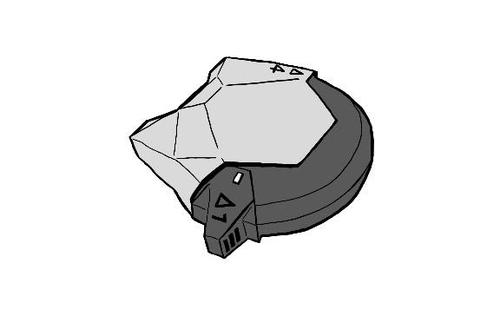
- The inhaler contains Asaris in the form of subsequent doses of inhalation powder.
- The inhaler is equipped with a dose counter that indicates how many doses of the medicine are left in the inhaler. The counter indicates the dose number up to the digit 0. The digits from 0 to 5 are marked in red to warn that there are only a few doses of the medicine left in the inhaler. If the counter shows the digit 0, it means that the inhaler is empty. The inhaler contains 60 doses of Asaris.
Using the inhaler
In order to use the inhaler, the patient should follow the instructions below:
1. Opening:
- To open the inhaler, the patient should
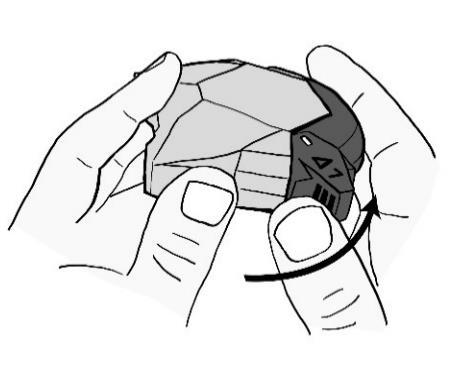
hold the cover with one hand, and with the other hand, using the thumb, slide the housing latch away fromthemselves- until it clicks.
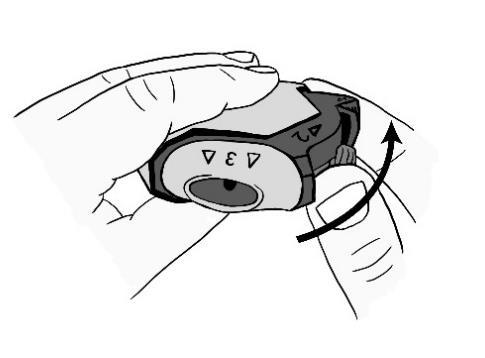
2. Setting the dose:
- The patient should hold the inhaler with the mouthpiece facing themselves. They can hold it with their right or left hand.
- They should slide the slider away from themselvesuntil it clicks.
- After sliding the slider, a small hole appears in the mouthpiece.
- The inhaler is ready for use.Each time the slider is moved, the next dose of the medicine is prepared for inhalation.
The patient should not move the slider unnecessarily, as this will open the next dose and reduce the number of doses of the medicine available for inhalation.
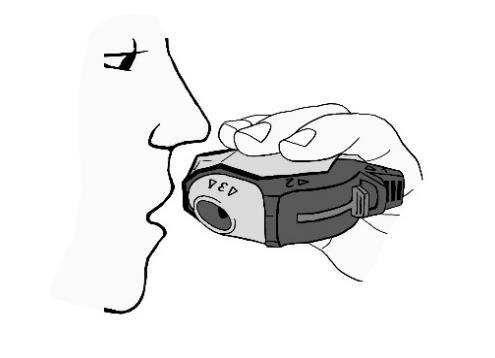
3. Performing the inhalation:
Before performing the inhalation, the patient should carefully read the instructions below.
- The patient should hold the inhaler at a certain distance from their mouth. They should remember not to turn the inhaler upside down, as this may cause the prepared dose of the powder to spill out. The patient should perform a calm, deep exhalation. They should not exhale into the inhaler.
- They should put the mouthpiece in their mouth; perform a deep inhalation
from the inhaler through the mouth, not through the nose.
- They should hold their breath, remove the inhaler from their mouth. They should hold their breath for a few seconds, or as long as possible, and then perform a calm exhalation.
- Rinsing the mouth with water and spitting it out after inhaling the medicine helps prevent hoarseness and thrush.
4. Closing:
- To close the inhaler, the patient should slide
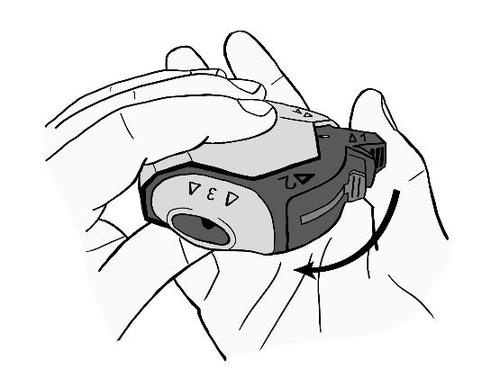
the housing latch towards themselves.
- Closing the inhaler is accompanied by a clicking sound. After closing the inhaler, the dose-setting slider automatically returns to its original position, and the outer cover protects the inhaler when it is not in use.
- The inhaler is ready for reuse.
Cleaning
In order to clean the mouthpiece of the inhaler, the patient should wipe it with a dry, soft cloth.
Using a higher dose of Asaris than recommended
It is important to take Asaris as recommended by the doctor. In case of accidental use of a higher dose than recommended, the patient should tell their doctor or pharmacist.
After using a higher dose than recommended, side effects such as:
- increased heart rate,
- tremors,
- headache,
- muscle weakness, joint pain.
In case of using higher doses for a long time, the patient should contact their doctor or pharmacist for advice, as high doses of the medicine may cause a decrease in the production of steroid hormones by the adrenal glands.
Missing a dose of Asaris
In case of missing a dose of Asaris, the patient should take it as soon as possible, and then continue to take the medicine as recommended by the doctor. The patient should not take a double dose to make up for the missed dose.
Stopping the use of Asaris
It is very important to take Asaris every day, until the doctor recommends stopping it. The patient should not suddenly stop taking Asaris or reduce the dose on their own.
Very rarely, in case of long-term use of high doses of the medicine, sudden withdrawal of the medicine or reduction of the dose may cause side effects, including:
- stomach pain,
- fatigue,
- loss of appetite,
- nausea, diarrhea,
- weight loss,
- headache or drowsiness,
- low potassium levels in the blood,
- low blood pressure and seizures.
Very rarely, similar side effects may also occur in case of infections or during periods of severe stress (e.g., accident or surgery). To prevent the occurrence of these side effects, the doctor may prescribe additional corticosteroids for use during this time.
In case of any further doubts about the use of this medicine, the patient should consult their doctor or pharmacist.
4. Possible side effects
Like all medicines, this medicine can cause side effects, although not everybody gets them.
In order to minimize the risk of side effects, the doctor will recommend the smallest dose of Asaris that provides control of asthma or COPD.
Allergic reactions: The patient may experience sudden difficulty breathing after using
Asaris.There may be an increase in wheezing, coughing, as well as itching and swelling (usually of the face, lips, tongue, or throat). In case of such symptoms occurring suddenly after using Asaris, the patient should immediately tell their doctor.Allergic reactions occur infrequently (may occur in less than 1 in 100 patients taking the medicine).
Other side effects:
Side effects that occur very frequently (may occur in more than 1 in 10 patients):
- Headache -this side effect usually decreases over time while continuing treatment.
- There have been reports of an increased frequency of colds in patients with COPD.
Side effects that occur frequently (may occur in less than 1 in 10 patients):
- Thrush (painful, creamy-white patches) in the mouth and throat, as well as tongue pain, hoarseness, and loss of voice. Rinsing the mouth with water and spitting it out after each inhalation may be helpful. The doctor may prescribe an antifungal medicine to treat thrush.
- Pain, swelling of the joints, and muscle pain.
The following side effects have been reported in patients with chronic obstructive pulmonary disease (COPD):
- Pneumonia (lung infection) in patients with COPD. The patient should tell their doctor if any of the following symptoms occur while using fluticasone propionate and salmeterol (in the form of salmeterol xinafoate); these may be symptoms of a lung infection:
- Fever or chills.
- Increased production of mucus, change in the color of mucus.
- Worsening of cough or increased difficulty breathing.
- Easier bruising and fractures.
- Sinusitis (feeling of tension and fullness in the nose, cheeks, and behind the eyes, sometimes with a pulsating headache).
- Decreased potassium levels in the blood (the patient may experience irregular heartbeat, muscle weakness, or cramps).
Side effects that occur infrequently (may occur in less than 1 in 100 patients):
- Very rapid heartbeat (tachycardia).
- Feeling of trembling and rapid or irregular heartbeat (palpitations) - these symptoms usually are not serious and decrease over time while continuing treatment.
- Muscle cramps.
- Feeling of restlessness.
- Irritation of the throat. Rinsing the mouth with water and spitting it out after each inhalation may be helpful.
Side effects that occur rarely (may occur in less than 1 in 1000 patients):
- Wheezing or breathing difficulties worsening immediately after taking the medicine.If such symptoms occur, the patient should stop using Asaris, use a fast-acting, inhaled bronchodilator, and immediately contact their doctor.
- Asaris may disrupt the normal production of steroid hormones by the body, especially when taking high doses of the medicine for a long time. These symptoms include:
- slowing of growth in children and adolescents,
- decrease in bone mass,
- cataracts and glaucoma,
- weight gain,
- rounding (moon-shaped) face (Cushing's syndrome). The doctor will regularly check if the patient is experiencing such side effects and ensure that the patient is using the smallest dose of Asaris that provides control of asthma.
- Increased blood sugar (glucose) levels (hyperglycemia). In patients with diabetes, it may be necessary to monitor blood sugar levels more frequently and adjust the dose of antidiabetic medicines being taken.
- Sleep disturbances and changes in behavior, such as excessive excitement and irritability (these symptoms occur mainly in children).
- Irregular heartbeat or extra beats (arrhythmias). The patient should inform their doctor about this, but should not stop using Asaris unless the doctor recommends it.
- Rash.
Side effects that occur with an unknown frequency (frequency cannot be estimated from the available data):
- Depression or aggression. The occurrence of these side effects is more likely in children.
- Blurred vision.
If any side effect worsens or any side effects not listed in this leaflet occur, the patient should tell their doctor or pharmacist.
Reporting side effects
If side effects occur, including any side effects not listed in this leaflet, the patient should tell their doctor or pharmacist. Side effects can be reported directly to the Department of Drug Safety Monitoring of the Office for Registration of Medicinal Products, Medical Devices, and Biocidal Products
Al. Jerozolimskie 181C
02-222 Warsaw
Phone: +48 22 49 21 301
Fax: +48 22 49 21 309
Website: https://smz.ezdrowie.gov.pl
Side effects can also be reported to the marketing authorization holder.
By reporting side effects, it is possible to gather more information on the safety of the medicine.
5. How to store Asaris
The medicine should be stored out of sight and reach of children.
It should be stored at a temperature below 25°C, in the original packaging to protect it from moisture.
The medicine should not be used after the expiry date stated on the packaging.
The expiry date stated on the packaging is the last day of the given month.
The inscription on the packaging after the abbreviation EXP means the expiry date, and after the abbreviation Lot means the batch number.
Medicines should not be disposed of via wastewater or household waste. The patient should ask their pharmacist how to dispose of medicines that are no longer needed. This will help protect the environment.
6. Package contents and other information
What Asaris contains
- The active substances of the medicine are: salmeterol (in the form of salmeterol xinafoate) and fluticasone propionate. Each inhalation dose contains 50 micrograms of salmeterol (in the form of salmeterol xinafoate) and 100, 250, or 500 micrograms of fluticasone propionate.
- The other ingredient is lactose monohydrate, which contains milk proteins.
What Asaris looks like and what the package contains
The medicine is in the form of an inhalation powder.
Packaging:
The medicine is delivered in an inhaler (inhalation device) equipped with a mouthpiece and a dose counter.
The inhaler contains a blister with the inhalation powder divided into 60 doses.
The outer packaging is a cardboard box.
Each package contains one or three inhalers.
Marketing authorization holder and manufacturer
Polfarmex S.A.
ul. Józefów 9
99-300 Kutno
Phone: 24 357 44 44
Fax: 24 357 45 45
e-mail: [email protected]
In order to obtain more detailed information, the patient should contact the local representative of the marketing authorization holder.
A detailed instruction manual for the inhaler is available by scanning the QR code below with a smartphone.

Date of the last update of the leaflet:
- Country of registration
- Active substance
- Prescription requiredNo
- Manufacturer
- ImporterPolfarmex S.A.
- This information is for reference only and does not constitute medical advice. Always consult a licensed doctor before taking any medication. Oladoctor is not responsible for medical decisions based on this content.
- Alternatives to AsarisDosage form: Powder, 50 mcg + 250 mcgActive substance: salmeterol and fluticasoneManufacturer: Aeropharm GmbHPrescription requiredDosage form: Powder, 50 mcg + 500 mcgActive substance: salmeterol and fluticasoneManufacturer: Aeropharm GmbHPrescription requiredDosage form: Powder, (50 micrograms + 500 micrograms)/doseActive substance: salmeterol and fluticasonePrescription required
Alternatives to Asaris in other countries
The best alternatives with the same active ingredient and therapeutic effect.
Alternative to Asaris in Spain
Alternative to Asaris in Ukraine
Online doctors for Asaris
Discuss dosage, side effects, interactions, contraindications, and prescription renewal for Asaris – subject to medical assessment and local rules.














